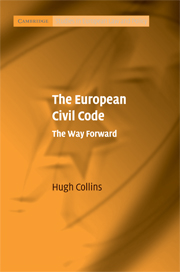Book contents
- Frontmatter
- Contents
- Preface
- Series editors' Preface
- Table of cases
- Table of treaties and legislation
- I Civil society and political union
- II The acquis communautaire in private law
- III The hidden code
- IV Private law and the Economic Constitution
- V Cultural diversity and European identity
- VI Respecting legal diversity
- VII Multi-level private law
- VIII Strengthening convergence
- IX Exploring the European Social Model
- Index
- CAMBRIDGE STUDIES IN EUROPEAN LAW AND POLICY
- References
IX - Exploring the European Social Model
Published online by Cambridge University Press: 26 February 2010
- Frontmatter
- Contents
- Preface
- Series editors' Preface
- Table of cases
- Table of treaties and legislation
- I Civil society and political union
- II The acquis communautaire in private law
- III The hidden code
- IV Private law and the Economic Constitution
- V Cultural diversity and European identity
- VI Respecting legal diversity
- VII Multi-level private law
- VIII Strengthening convergence
- IX Exploring the European Social Model
- Index
- CAMBRIDGE STUDIES IN EUROPEAN LAW AND POLICY
- References
Summary
Those who favour a European Code should not despair. The Frame of Reference will be the first step. When it is there one can imagine as a next step an Optional Instrument which will begin as an opt-in model and eventually become an opt-out model. After some time the Code of Obligations will become a reality.
This prediction made by Ole Lando, a distinguished founder of the modern movement for harmonisation of European contract law, may well prove correct. Despite its denials that it is doing any such thing, it is possible that the European Commission favours this strategy. There is certainly evidence to support the claim that the Commission has embarked on the project by constructing this code in a hidden way as the ‘soft law’ of the Common Frame of Reference (CFR). But Professor Lando's positive evaluation of this path towards a European Civil Code is surely misguided.
Creeping, surreptitious codification, as it has been labelled, is precisely the wrong way to bring this project to a successful fruition. Many arguments against this particular course of action have been explored in the course of this book. The first concern stems from the distortions in the content of a civil code likely to be generated by the current limited competence of the institutions of the European Union. The internal market agenda drives the project towards a focus on reductions in obstacles to cross-border trade rather than a consideration of the deeper issues regarding the European Social Model and an Economic Constitution which a civil code inevitably raises.
- Type
- Chapter
- Information
- The European Civil CodeThe Way Forward, pp. 238 - 256Publisher: Cambridge University PressPrint publication year: 2008



